Key takeaways:
- Genre evolution in music reflects cultural shifts and influences, highlighting the seamless blending of styles.
- Metal music originated as a form of rebellion, incorporating elements from various genres like blues and punk.
- The rise of technology has transformed music production and promotion, increasing accessibility for artists and listeners alike.
- Future trends in metal include genre fusion, technological advancements, and a focus on environmental themes in lyrics.
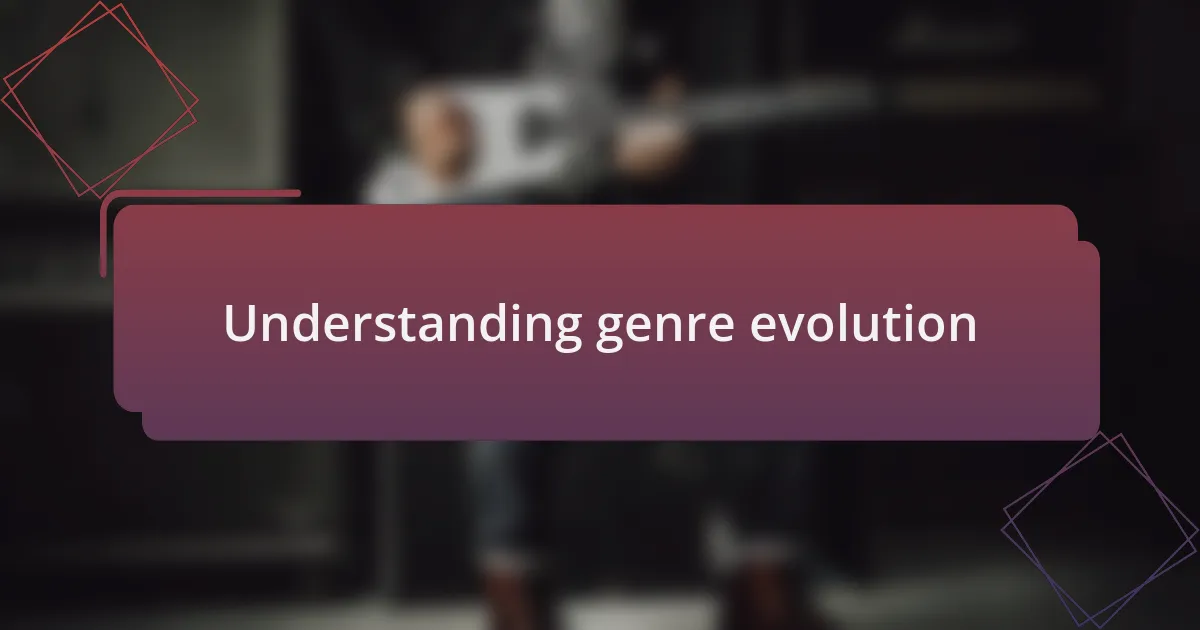
Understanding genre evolution
Understanding genre evolution is a fascinating journey that reveals how music transforms alongside culture and society. I remember the first time I listened to a fusion of metal and jazz; it was a revelation. How could two seemingly different genres come together so seamlessly? This blending reflects not just musical experimentation but also the shifting tastes and identities within the music community.
As I delve deeper into genre evolution, I can’t help but feel a sense of nostalgia mixed with excitement. The transition from classic heavy metal to its subgenres like thrash and black metal exemplifies how artists push boundaries. Have you ever noticed how each subgenre brings a unique vibe? I certainly have, and it shows me how much our experiences shape musical preferences and, ultimately, the sound of the genre itself.
The evolution of genre is also a testament to the influence of technology on music production. When I think about how digital tools have transformed recording techniques, it excites me to envision what the future holds. Isn’t it interesting how these innovations allow us to explore sounds and styles that were once unimaginable? Understanding this evolution gives us insight not just into music, but into our own lives, shaping our tastes in ways we may not even realize.
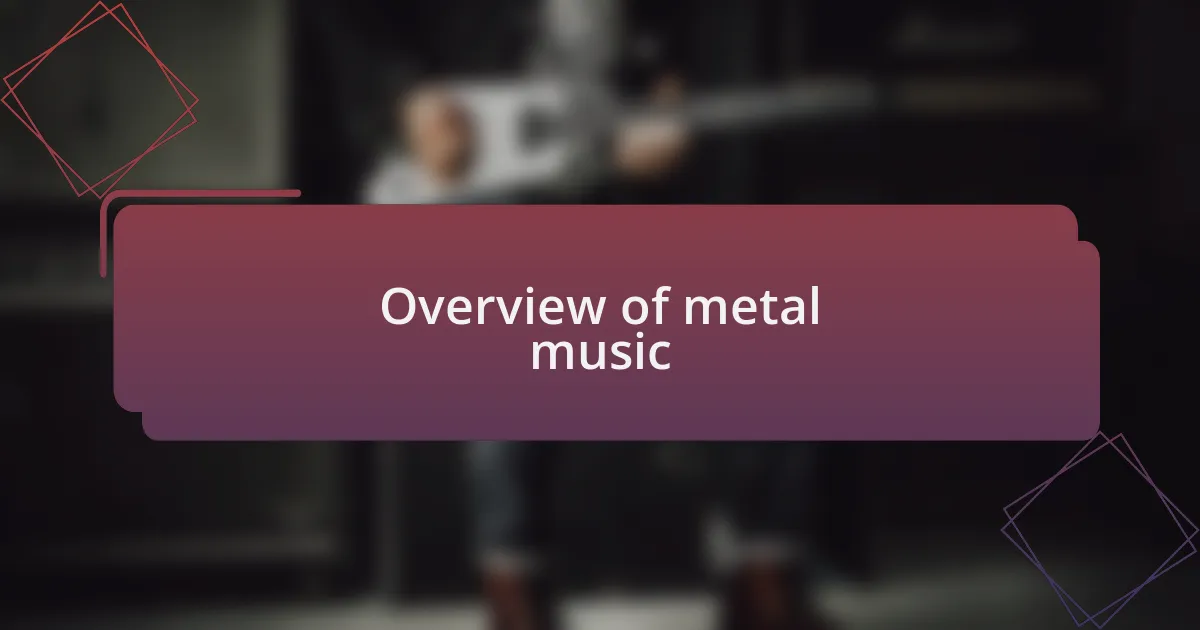
Overview of metal music
Metal music, in its essence, emerged as a powerful expression of rebellion and raw emotion. I vividly recall the first time I heard Black Sabbath; the heavy guitar riffs and haunting lyrics struck a chord deep within me. It was as if the sound was capturing all the frustrations and hopes of a generation, providing both a voice and a release for the surging energy of youth.
As I traced the roots of metal, I found it fascinating how it incorporates elements from blues, rock, and even classical music. This blend is what gives metal its rich texture, allowing bands to explore complex themes. Have you ever thought about how diverse influences have created an intricate landscape like doom metal or symphonic metal? Each style not only showcases musicians’ prowess but also reflects cultural narratives that resonate with fans all over the world.
Over the years, metal has continued to evolve, embracing new sounds and ideas while staying true to its core. My first experience at a metal festival opened my eyes to the vast community surrounding this genre. Imagine being surrounded by thousands of fans, each sharing an unbreakable bond through the power of music. That unity is invigorating and speaks to the genre’s capacity to adapt, nurture, and even challenge the boundaries of artistic expression.
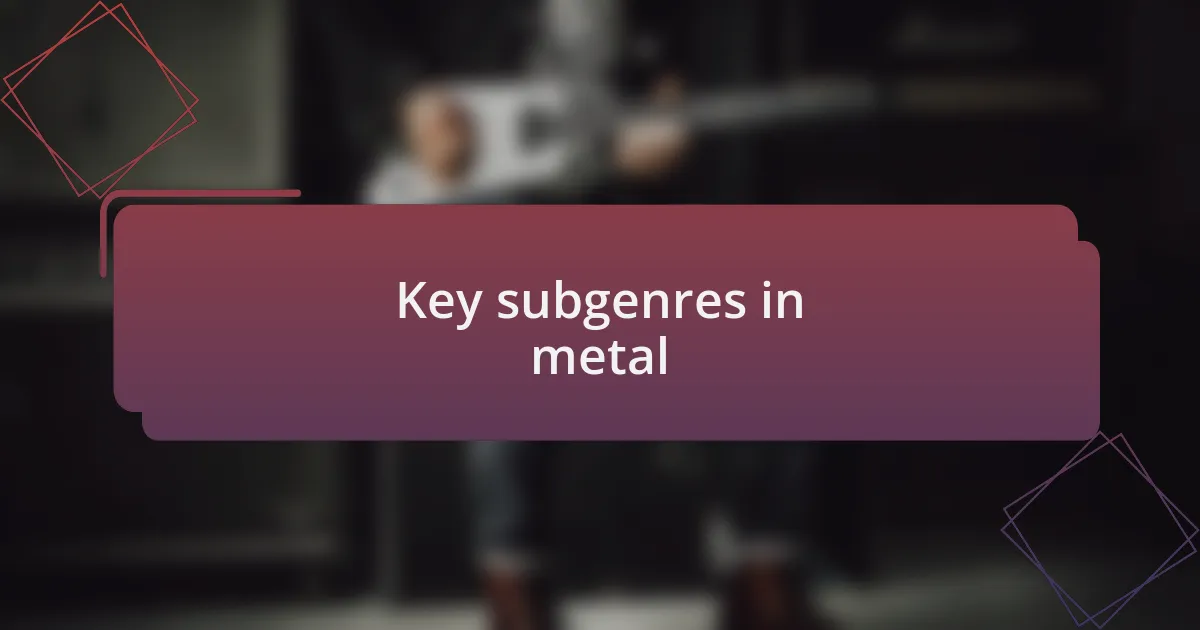
Key subgenres in metal
When I think about key subgenres in metal, I can’t help but consider the raw intensity of thrash metal. Bands like Metallica and Slayer pioneered this sound in the ’80s, channeling speed and aggression into their music. I remember the first time I listened to “Master of Puppets”; the blistering pace took my breath away, perfectly capturing the chaos of societal issues.
Doom metal, on the other hand, has its own unique allure with its slow, heavy riffs that create an atmosphere of impending doom. Listening to bands like Black Sabbath again conjures vivid imagery of shadowy landscapes and deep emotional struggles. It’s a reflective experience, making me ponder—how can music evoke such profound feelings with just a few heavy notes?
Then there’s symphonic metal, which blends orchestral elements with the traditional metal sound. I was taken aback the first time I heard Nightwish; their ability to weave epic stories through music was captivating. The layers of sound created an almost cinematic experience, pulling me into a different world—a reminder of how expansive and transformative metal can truly be.
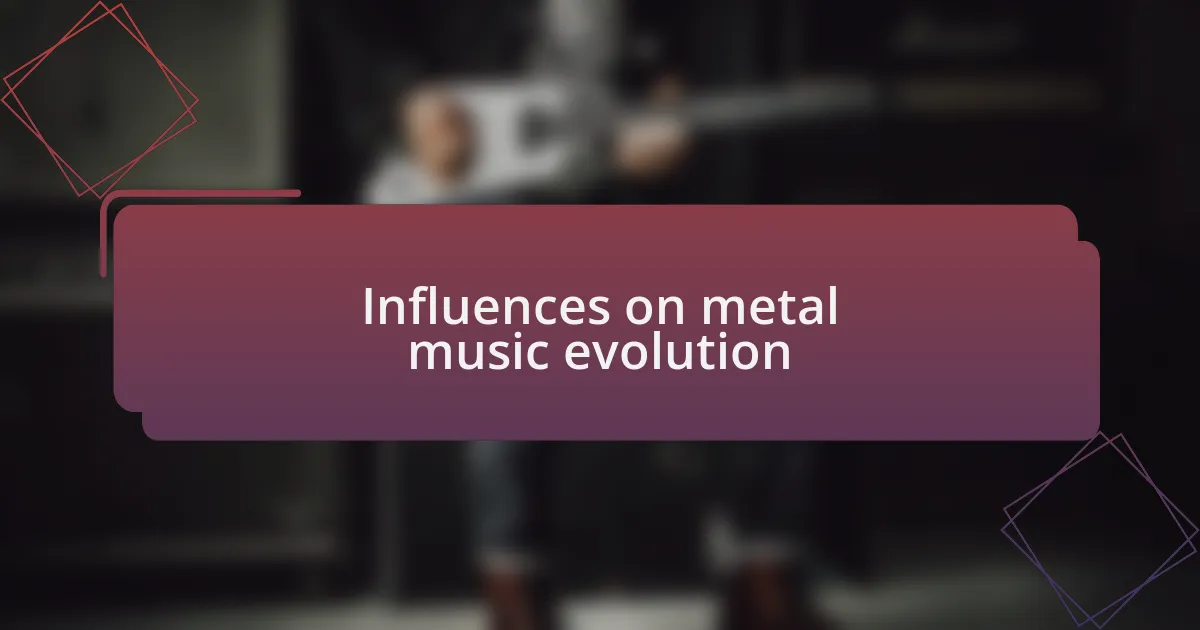
Influences on metal music evolution
Metal music has always been a melting pot of influences, and one of the most significant came from the blues. When I delve into the early riffs and solos of iconic metal bands like Led Zeppelin and Deep Purple, I can hear that bluesy essence shining through. It makes me wonder—how did these artists take sorrow and pain from the blues and fuel them into something so powerful and energetic that it feels almost cathartic?
Another crucial influence is punk rock, which injected a sense of rebellion and attitude into metal. I remember attending a concert where a hardcore punk band opened for a metal act. The energy was palpable, and it struck me that punk’s rawness challenged metal musicians to embrace a more aggressive sound, inspiring subgenres like thrash and even some elements of death metal. Isn’t it fascinating how two genres can intersect, creating a new wave of music?
Additionally, the emergence of electronic music has shaped the landscape of metal significantly. Listening to the blend of industrial sounds in Fear Factory or the electronic elements in modern metalcore bands makes me appreciate the innovation that artists bring to the table. It raises the question—how far can metal evolve while still staying true to its roots? For me, this fusion not only expands the genre’s horizons but also invites new listeners to experience the relentless power of metal in fresh and exciting ways.
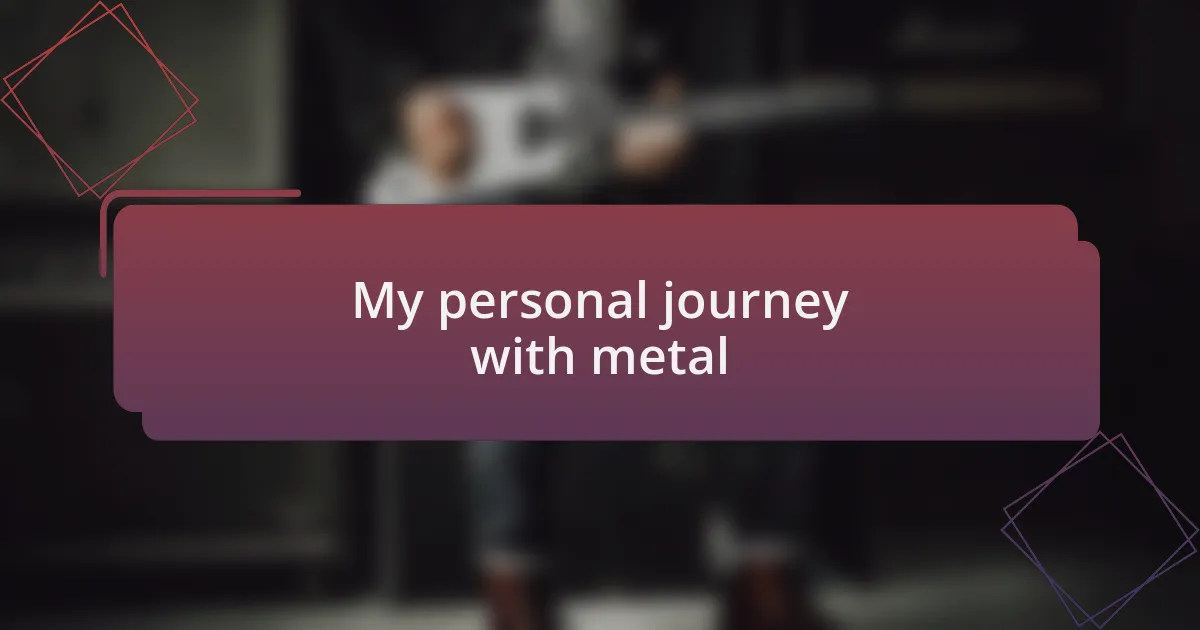
My personal journey with metal
My personal journey with metal has been transformative, marked by a deep connection to the music that often borders on spiritual. I still remember the first time I heard Metallica’s “Master of Puppets.” It was as if a switch flipped in my mind—every chord resonated with the struggles I faced, channeling my frustrations into something powerful and alive. How could a song speak to my soul so deeply?
Attending my first metal concert was another milestone that shaped my experience. As the lights dimmed and the first notes rang out, I felt a surge of adrenaline course through me. The crowd’s energy was electric, bound by a shared passion for the music. In that moment, I realized that metal isn’t just about the sound; it’s about community and connection. It brings people together, doesn’t it?
Over the years, my tastes have evolved alongside the genre itself. I’ve ventured into subgenres I never thought I would enjoy, like black metal and progressive metal. There’s something exhilarating about discovering new layers within metal, whether it’s the intricate guitar work of a band like Opeth or the raw emotion of a band like Mastodon. Each new discovery reignited my passion, showing me there’s always more to explore in this vast, ever-evolving landscape. It makes me wonder—what’s next for metal, and where will my journey take me?
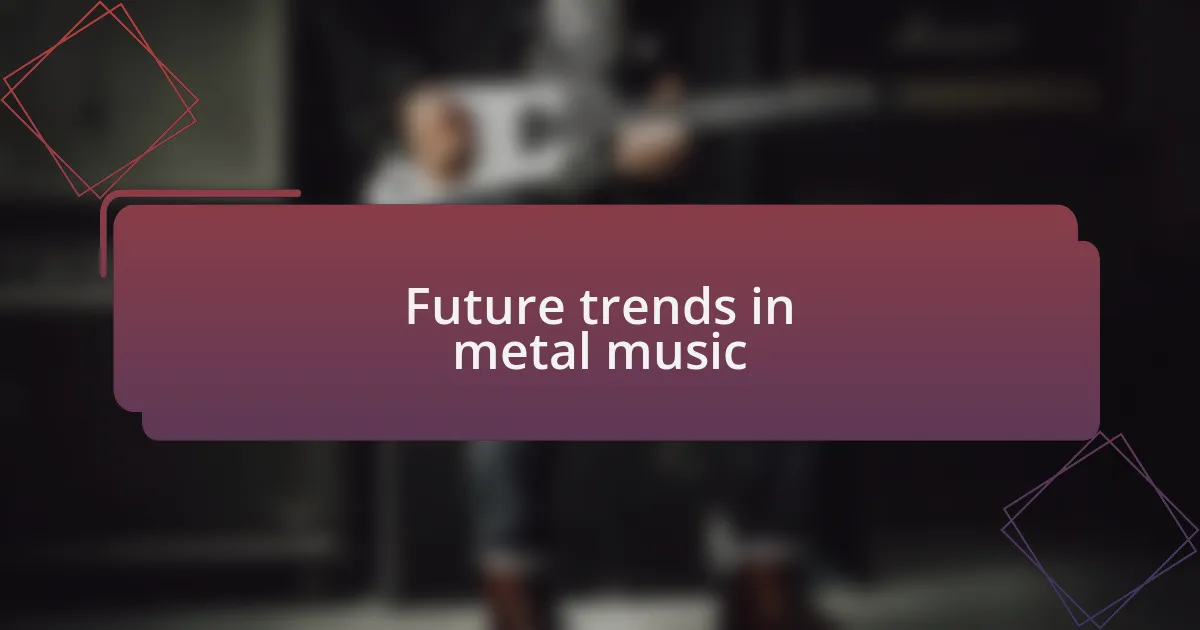
Future trends in metal music
As I look ahead, I can sense that fusion will play a significant role in shaping the future of metal music. Bands are increasingly experimenting with blending metal with other genres like electronic music and hip-hop, creating a sound that feels fresh and innovative. I remember hearing a collaboration between a metal band and a DJ—a mix of brutal riffs and pulsating beats—and it made me realize how the lines between genres are blurring, opening doors for creativity.
Another trend I’ve observed is the rise of technology in metal production. With the advent of advanced software and production techniques, musicians can experiment in ways we couldn’t have imagined a decade ago. For instance, I recently listened to an album recorded entirely at home, where the artist used virtual instruments to create a rich, layered sound. It struck me how accessible music-making has become, allowing more voices in the metal community to emerge and share their stories.
Environmental themes are also making their way into metal lyrics and imagery, reflecting a growing awareness of the world around us. I’ve noticed bands addressing climate change and societal issues head-on in their music. It’s a powerful reminder that metal can be a force for change, echoing the passions and concerns of our times. How thrilling it is to think that metal not only evolves musically but also becomes a platform for important conversations!
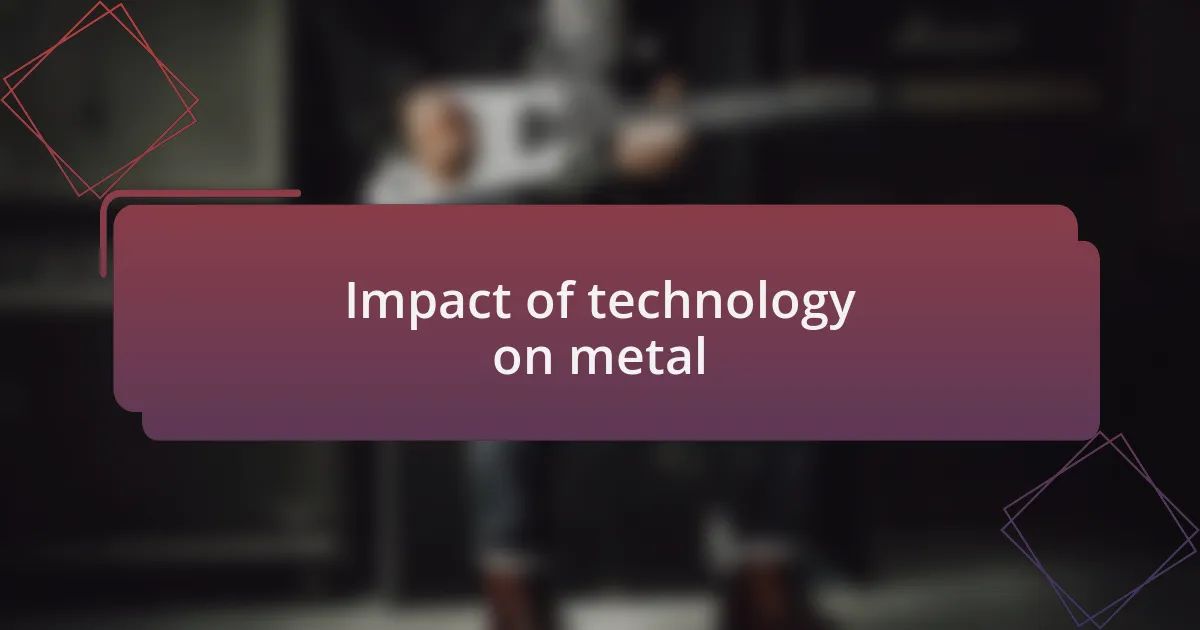
Impact of technology on metal
Technology has undeniably transformed the landscape of metal music in profound ways. I recall the first time I experimented with digital audio workstations (DAWs) to record my own guitar riffs. It felt incredible to see my ideas come to life through technology, allowing me to layer tracks and tweak sounds until they matched my vision. The ability to have such control over production means that aspiring musicians can create high-quality sounds from their bedroom, leveling the playing field.
Moreover, the rise of online platforms has significantly shifted how metal bands promote their music. I still remember when I discovered a local band through a viral video on social media. Their sound was raw and powerful, yet I never would have encountered them without the reach of technology. This newfound accessibility for both listeners and creators fosters a richer diversity within the genre, prompting more conversations about the state of metal music.
Let’s not forget about the role of streaming services in the evolution of metal. With a few clicks, I can explore entire catalogs from around the globe. This access challenges the notion of “mainstream” and lets underground artists gain recognition. But I often ponder, does this abundance of choice dilute the experience of discovering new music, or does it enhance our appreciation for the craft? In my experience, it pushes us to seek deeper connections with the music we love.